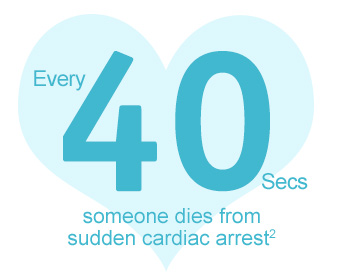Sudden Cardiac Arrest is a serious and life-threatening medical emergency. During Sudden Cardiac Arrest, heart function stops — abruptly and without warning. This causes a rapid loss of consciousness (fainting). Without immediate treatment with defibrillation (an electric shock to the heart), brain damage and death can occur.¹

The definitions of Sudden Cardiac Arrest and heart attack are completely different. A heart attack is a "plumbing" problem caused by one or more blockages in the heart's blood vessels that prevent proper flow. A person having a heart attack is awake and breathing.
How a healthy heart works
Sudden Cardiac Arrest is defined as an electrical problem, caused by an arrhythmia (irregular heartbeat) that prevents the heart from pumping blood to the brain and vital organs. A person experiencing Sudden Cardiac Arrest is unconscious and not breathing.
Sudden Cardiac Arrest (SCA) explained
Factors such as high blood pressure or heart disease increase the risk for Sudden Cardiac Arrest. It’s not uncommon for a person to have a heart problem and not be aware of it until after Sudden Cardiac Arrest has occurred.
Did you know? Every 40 seconds, someone dies from Sudden Cardiac Arrest².


